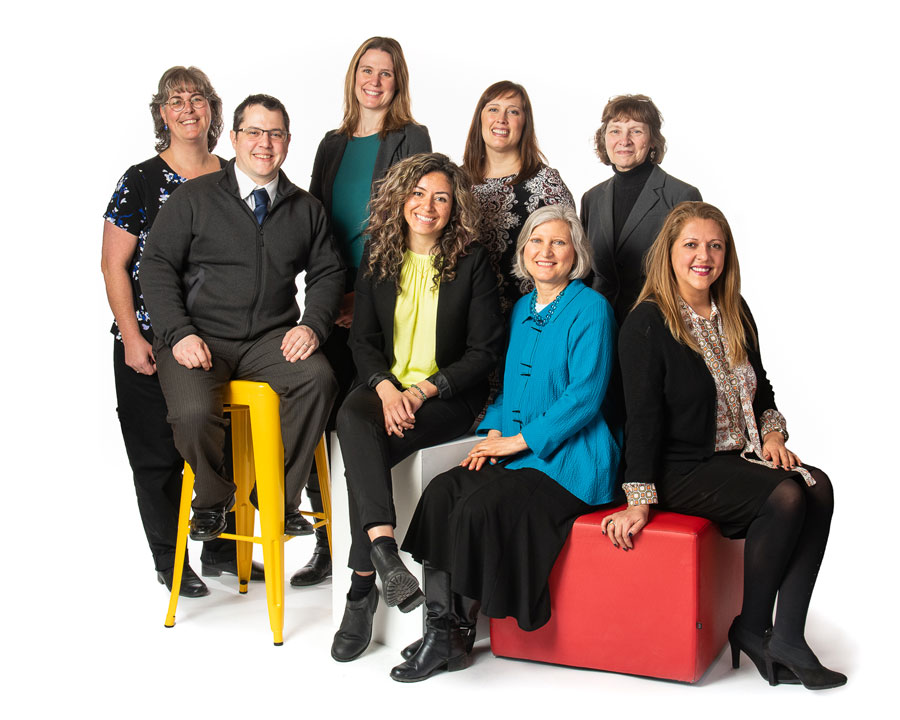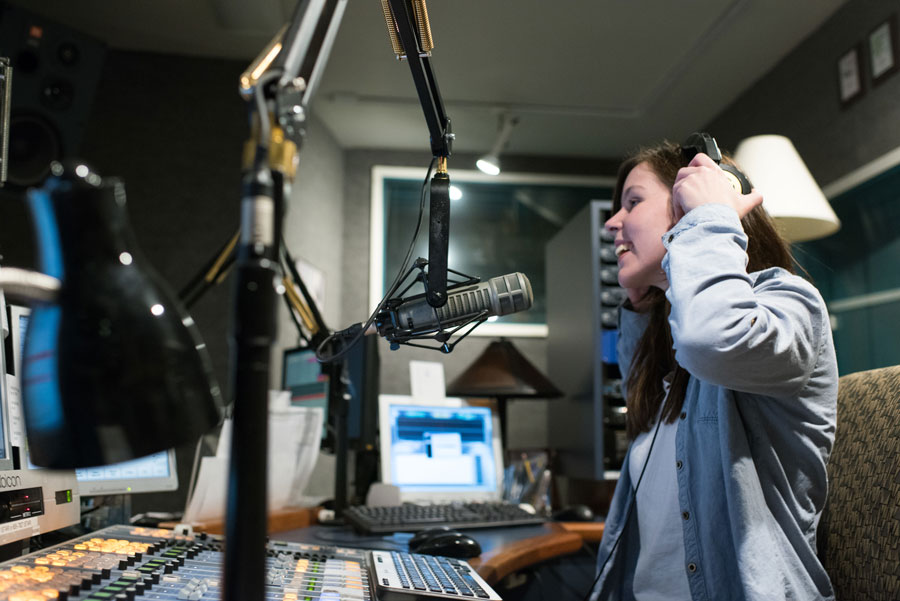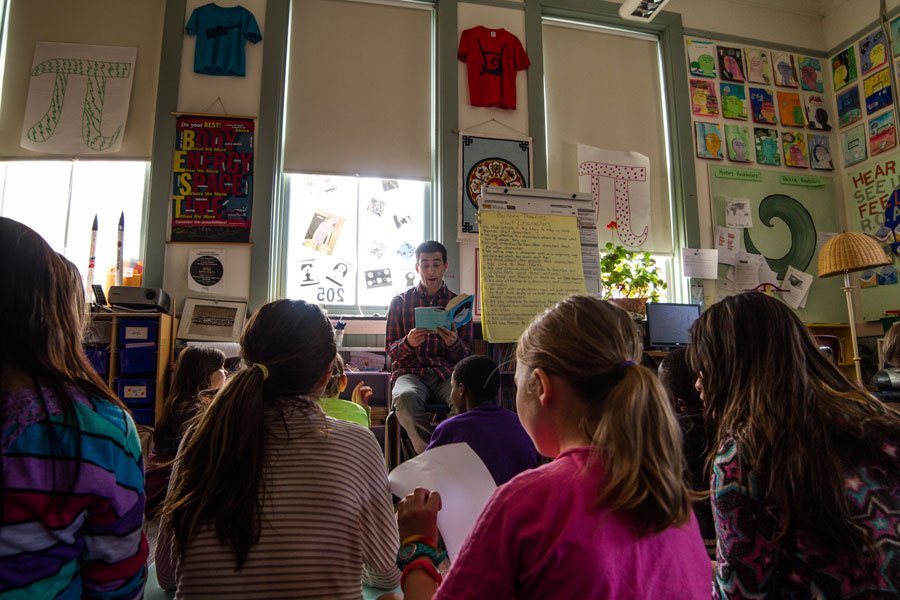An interview with Assistant Director and Career Coach, Kerry Shackett, on Champlain’s personalized approach to career-focused internships.
In movies, there is a classic image of the intern. The individual is vaguely flustered, running around the office with a stack of yellow folders in one hand and a tray of coffee in the other. They rush to get all of their tasks done—copy the right pages, put the right envelopes in the right mailbox—and inevitably end up getting someone’s coffee order wrong. This is what many people expect when they land their first college internship. At Champlain College, we have taken that classic image and turned it on its head.
“When our students are at an internship site, they don’t stand beside the photocopier all day or fetch coffee on demand,” says Kerry Shackett, the Assistant Director of the Career Collaborative and the Career Coach for the Division of Communication & Creative Media. “Setting up serious internships for our students is one of the ways Champlain stands out.”


How Champlain Students Find Great Internships
Champlain’s Career Collaborative is a career center that teaches real-world readiness and career positioning. It helps students discover and pursue the best career path for their interests and goals. Students visit the Career Collaborative to learn interview skills, tweak their resumes and cover letters, and find guidance when applying for internships and jobs. When our students talk to their Career Coach, they can be sure they will be offered solid advice and sent off on the right path.
We’re like match-makers. Champlain is interested in what our students are interested in, and we do everything we can to get them to where they want to be.
Kerry Shackett, Career Coach at Champlain’s Career Collaborative
“The Career Collaborative has designated Career Coaches for each major, which allows us to become internship experts in our fields,” explains Shackett, who manages internships for students in Professional Writing, Filmmaking, Creative Media, Communication, Visual Communication Design, and Broadcast Media Production majors.


Because of their expertise, each coach at the Collaborative knows which organizations are hiring and which ones offer quality internships. The coaches steer students towards internships that will benefit their learning and development—places where they can work on real projects with real clients and build their career profiles and portfolios. Our students write code and copy, not memos.
A large part of this quality assurance comes from the careful steps our coaches take to help students and employers alike. Having a point of contact at Champlain in the Career Collaborative ensures impressive opportunities and smooth experiences for everyone involved.
“We build strong employer contacts, so we can coach businesses on how to create a really meaningful internship—which, when you have 10,000 students at your school, you might not be able to do,” Shackett notes. “We work with the employer and student to make sure the internship is a terrific opportunity for both parties.”
By connecting with the internship site, the Career Collaborative ensures the organization understands the specific goals of the student, including what the student would like to achieve in the position.


Internships Vs Jobs
The Career Collaborative also makes sure our internships follow guidelines set out in the Department of Labor’s Fair Labor Standards Act.
“The Department of Labor’s rules offer a structure for really great internships, and their guidelines ensure internships are legally fair for all students,” explains Shackett.
Through the Department of Labor’s rules, a fair internship means that:
- Compensation is not expected. (Compensation can imply that the student is an employee rather than an intern—although some employers may provide wages for internships anyway!)
- The employer provides training.
- The internship corresponds to academic credit and/or coursework for the student.
- The position respects the academic calendar and puts the student’s academic commitments first.
- The internship lasts only as long as the student is gaining beneficial knowledge and experience.
- The internship complements the work of paid employees—and doesn’t displace it.
- Both the student and the employer acknowledge there is no promise of a paid position after the internship ends.
“Some big companies have broken the rules by offering unpaid internships in which students took the place of full-time employees,” explains Shackett. “At Champlain, we make sure everyone is informed about the Fair Labor Standards Act. Companies may not know what constitutes an illegal internship. The organization’s intentions are great, but they might not be aware of the rules, and we can help them build better positions.”
By understanding these rules, and by helping employers understand them too, Champlain students are sent to internships in which they will be compensated monetarily or through credit. Plus, they are placed where they will be given substantial, skill-building projects and assignments.


The Value of a Small Community: Enthusiasm
The last—and most important—step in making sure our students never run coffee at an internship is our Career Coaches’ connections with the students themselves.
“Because we are a smaller school, we can learn what our students are interested in, and act as a matchmaker between the internship site and student,” explains Shackett. “It’s less of this mass production of, “Hey, Company X will take six interns, just apply here,” kind of conversation that may happen at a larger school, but more of a, “I know you like a quieter environment, and this small office that is hiring might be the best fit for you.’”
By building a relationship with our students, the Career Collaborative can help them find experiential opportunities, such as freelance projects, internships, and micro-internships, that are relevant to their personal goals and interests.
“We’re like matchmakers,” says Shackett. “Champlain is interested in what our students are interested in, and we do everything we can to get them to where they want to be.”
Because of Champlain’s focus on meaningful experience, our interns have created artwork used in games being sold today, worked as pentesters on ethical hacking, developed e-commerce websites, managed client portfolios, handled real tax information, created online ad campaigns, wrote articles for magazines, and produced film clips for TV.
“A small office at a small campus with a group of passionate and career-ready students can accomplish amazing things for our students and partner organizations,” explains Shackett. “At a big school, you just get sent into the system, but that’s not what we do here at Champlain.”
Interested? Learn more about internships at Champlain College. Read Q&As with students about their internships and more in our student stories on The View, and check out our career-focused majors here.